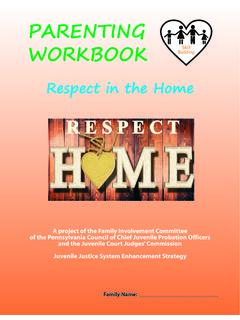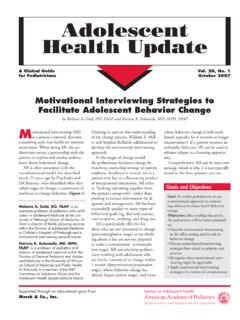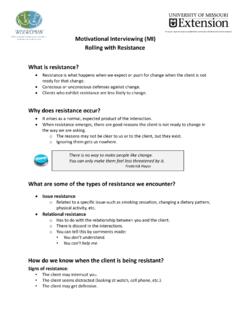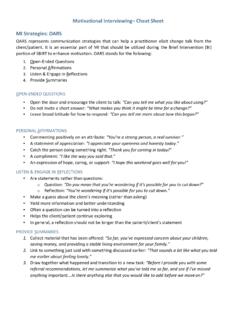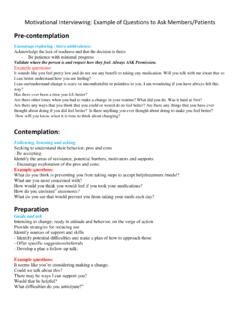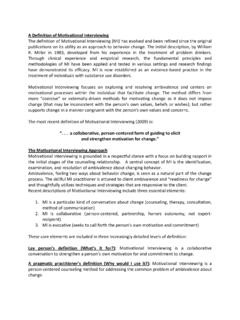Transcription of MOTIVATIONAL INTERVIEWING OAHES’ WORKOOK
1 MOTIVATIONAL INTERVIEWING COACHES WORKBOOK Purpose: In 2015, the MOTIVATIONAL INTERVIEWING Implementation and Practice Manual became available to all juvenile probation departments as a resource of steps, materials, strategies , and protocols to guide departments in the training and implementation of MOTIVATIONAL INTERVIEWING practices. The Manual highlights the awareness that the investment into this Stage 2 activity of the Juvenile Justice System Enhancement Strategy (JJSES) is intentional and purposeful within an average two-year process. Given differences in pace and timing, counties across the Commonwealth are at various stages of MI implementation. Nonetheless, what has been found to be critical is the identification, support, and continuous training of MOTIVATIONAL INTERVIEWING coaches. This workbook is intended to offer coaches assistance in this vital role and provide tools for staff training.
2 Use: Probation Officer proficiency in the use of MI requires ongoing boosters, small group trainings, reinforcement of MI skills, and the providing of feedback. The role of an MI coach is to be an ambassador in executing these learning events. This will not only enhance the proficiency and confidence of the MI coach, but it will also move the department from proficiency into implementation and long term sustainability. The time that an MI coach will spend in this role will vary based on the individual needs of their department. At a minimum, bi-annual half-day booster trainings are recommended. Booster training topics should include all of the Eight Stages of MOTIVATIONAL INTERVIEWING : 1. Spirit of MI 2. OARS Purpose and Use of the MOTIVATIONAL INTERVIEWING Workbook 3. Recognizing Change Talk 4. Eliciting and Strengthening Change Talk 5. Resistance 6. Developing a Change Plan 7. Consolidating Client Commitment 8.
3 Switching Between MI and Other Methods An important theoretical contribution to MOTIVATIONAL INTERVIEWING is Prochaska and DiClemente s Stages of Change model (DiClemente & Velasquez, 2002). Understanding the Stages of Change model and accurately assessing which stage the youth is at is critical. Failing to focus on the tasks of the appropriate stage can lead to disengagement, predictable failures, and violations. It is therefore recommended that Stages of Change be added as a training topic for enhancing MOTIVATIONAL INTERVIEWING skills. Additionally, MI coaches can assist in skill practice, engage in policy and procedure discussions, individualize training needs (especially for new hires), promote stakeholder engagement, and become a regional resource for neighboring counties. The Workbook is organized by the eight stages of learning MOTIVATIONAL INTERVIEWING and the Stages of Change model. Various modalities will be provided to accommodate learning styles, formats, and training durations.
4 Some activities will overlap into other chapters and JJSES related activities. Where overlap exists, cross references will be noted at the bottom of the material. CONTENTS Chapter 1 Spirit of MOTIVATIONAL INTERVIEWING Chapter 2 Core MI Skills: OARS Chapter 3 Recognizing Change Talk Chapter 4 Eliciting and Strengthening Change Talk Chapter 5 Rolling with Resistance Chapter 6 Developing a Change Plan Chapter 7 Consolidating Client Commitment Chapter 8 Switching Between MI and Other Methods Chapter 9 Stages of Change CHAPTER 1 THE SPIRIT OF MOTIVATIONAL INTERVIEWING Handout : PACE Handout : SPIRIT OF MI CHECKLIST Introduction & Directions: These handouts provide easy reference to the components of the spirit of MOTIVATIONAL INTERVIEWING along with a checklist reminder. The quote by Stanley Kubrick, a well-known film director, offers another way of understanding the importance of the spirit of MI.
5 The handout may also be used as an email reminder/attachment to keep MI alive between booster sessions. Purpose: Provides a simple definition of the spirit of MI, a visual aid, a checklist, and a quote to capture its importance using little instruction or interaction. HANDOUT The Spirit of MOTIVATIONAL INTERVIEWING Definition: MI is more than the use of a set of technical interventions. It is also relational and characterized by a way of being with the client. This relational dimension is referred to as the spirit of MI which has four main components. Mindful attention to the spirit of MI builds rapport and professional alliance. P A C E PARTNERSHIP - Collaboration means working in partnership with the client. We don t MI people; rather, we use MI with people. AUTONOMY/ACCEPTANCE - In general, if people think that they are making changes for their own reasons, they are more likely to maintain new behaviors.
6 The opposite of autonomy support is to make people do things, to coerce and control. COMPASSION - To actively promote the other s welfare, to give priority to the other s needs. An awareness of what is of benefit to the client. EVOCATION - The resources for change and motivation are presumed to reside within the individual. We want the offender in an active-speaking role, rather than in a passive listening role. HANDOUT The Spirit of MOTIVATIONAL INTERVIEWING : Checklist Partnership MI is a collaborative partnering with the youth and families we serve. Sees the youth as the expert on themselves. Asks for permission. Avoids premature focus. Focuses on mutual understanding versus the probation officer being right. Acceptance The probation officer is a guide, but the youth must make their own decisions to change. Respects the youth s autonomy regardless of whether they change.
7 Informs and encourages choices without judgment. Sees ambivalence as normal. Compassion The probation officer demonstrates genuine care and concern. Understands and validates the struggle. Evocation Instead of telling juveniles what to do, MI evokes the youth s own motivation and resources for change. Trusts the youth to be motivated for something. Relies on asking versus telling. Avoids the expert trap. You may not remember all of the processes and techniques of MI, but if you incorporate the Spirit of MI in all of your interactions with youth, you would have gone a long way in making a difference. Adapted from CCNC MOTIVATIONAL INTERVIEWING Resource Guide, Community Care of North Carolina. Retrieved from The truth of a thing is the feel of it, not the think of it. -Stanley Kubrick ACTIVITY Activity Overview and Major Concepts: This activity demonstrates how MI blends with other JJSES activities, with a primary focus on the Four Core Competencies, and even more specifically, on the Professional Alliance Traits.
8 Take-Aways: 1. Learners will be able to demonstrate how MI skills blend with and assist in developing the core Professional Alliance skills. Instructions: There are 2 sheets as a part of this activity a list of statements that highlights the key concepts of the spirit of MI, and the List and Definitions of the Professional Alliance Traits. Using the Professional Alliance Trait List as their worksheet, participants should match the Spirit of MI concept with the appropriate traits, listing the number of the MI Key Concept at the end of the Professional Alliance Trait definition. Assure the participants that there may be more than one key concept that relates to the Professional Alliance Trait. Materials & Equipment Needed: 1. Pen/Pencil 2. Spirit of MI Key Concepts Sheet 3. Professional Alliance Traits Worksheet 4. Answer Guide Time Expected: Hints & Tips: This activity can be done in large or small groups with a partner.
9 Allow participants time to discuss with their partners. After they have had time to complete, ask for volunteers to give their answers. Seek additional answers that may be different from other groups. Answers can also be given in a round robin style. Highlight to the group that there truly are no right or wrong answers. Experience Level Barometer: Cross References: Four Core Competencies, Professional Alliance Spirit of MI and Professional Alliance Traits ACTIVITY The Spirit of MOTIVATIONAL INTERVIEWING KEY CONCEPTS: 1. Motivation to change is elicited from the client and not imposed. 2. It is the youth s task, not the PO s, to articulate and resolve his or her ambivalence. 3. Direct persuasion is not an effective method for resolving ambivalence. 4. The conversation style is generally a quiet and eliciting one. 5. The PO is directive in helping the youth examine and resolve ambivalence. 6. Readiness to change is not a client trait but a product of interpersonal interaction.
10 7. The relationship is more like a partnership than expert/recipient roles. ACTIVITY Professional Alliance Traits Articulate - Provides sufficient detail and context for true communication to occur. Attentive - Uses nonverbal communication to indicate engagement. Authentic - Does not use manipulation in order to gain compliance. Confidence - Knows the business of juvenile justice and communicates it. Teaches and gives information instead of lecturing. Empathetic - Does not accept misbehavior but can relate to how that behavior comes about. Is nonjudgmental but does not excuse or sympathize with antisocial or criminal behavior. Understands how barriers may have contributed to difficulties. Recognizes that different people require different interventions. Empowering - Believes people can change and communicates this belief with conviction. Provides opportunities for youth to stretch out of their comfort zones.



